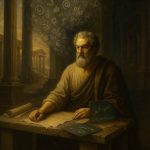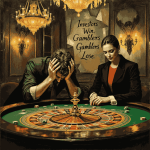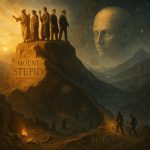Power vs. Force: Exploring New Perspectives Through Dialogue
Oct 27, 2024
“It is better to be feared than loved if you cannot be both.” – Machiavelli
Imagine a cosy study, flickering firelight casting shadows as Alexander and Sophia settle into their armchairs, their animated voices barely above a whisper. These two brilliant minds are about to plunge into the age-old tension between power and force. Power is the quiet influence that guides without demanding; force is the blunt instrument that seeks to dominate. Despite their strikingly different natures, they are frequently confused.
What truly separates them? Is power merely quiet strength while force embodies raw might? Or does the answer lie deeper, in their very essence?
In this dialogue, Alexander and Sophia will unravel these contrasts, leading us through a thought-provoking exploration of philosophy, psychology, and the complexities of human nature.
Alexander: Good evening, Sophia. I trust this fine evening finds you well. I’m drawn to a topic that has intrigued thinkers for ages—the contrast between power and force. It’s a subject ripe for exploration, and I believe our discussion may shed new light on this age-old conundrum. Shall we embark on this intellectual voyage together?
Sophia: Absolutely, Alexander. The distinction between power and force warrants deep contemplation. It’s a subtle yet profound difference, often misunderstood and misused.
The Nature of Power and Force
Alexander: Power, at its core, is a formidable entity that shapes destinies, ignites revolutions, and forges enduring legacies. Yet, its frequent associations with dominance and coercion distort its true essence. True power transcends mere control; it commands with precision and finesse. It inspires, elevates, and leaves an indelible mark on hearts and minds—an imprint that endures long after the echoes of force fade.
Sophia: Precisely, Alexander. Genuine power is not about subjugation; it’s about enlightenment and transformation. It embodies wisdom, innovation, and strategic foresight. When wielded effectively, power moves mountains without conflict, reshapes history without bloodshed, and unites disparate factions. Power is not heavy-handed; it’s a creative force—the foundation upon which enduring change is built.
Alexander: Exactly. In stark contrast, force is a primal tool rooted in coercion and intimidation. It aims to dominate, bending wills through brute strength or threats. While force may secure compliance, it utterly lacks the profound influence of true power commands.
Sophia: Precisely! Force appeals to basic survival instincts, provoking obedience but never genuine loyalty. People may yield to force out of fear, yet their hearts and minds remain untouched, secretly nurturing rebellion. Wielded without wisdom, force becomes a hollow victory—a fleeting triumph destined to collapse.
The Psychology of Power and Force
Sophia: Let’s dissect the psychology underlying power and force. Why does force, despite its immediate impact, often fail to secure enduring dominance?
Alexander: Force operates on primal instincts, generating compliance but lacking true conviction. It elicits superficial obedience but fails to penetrate the psyche. People may yield to fear, yet such loyalty is ephemeral, evaporating once the threat is removed.
Sophia: Exactly. True power, however, resonates with our aspirations, ideals, and emotions. It forges lasting connections, inspiring alignment with a vision greater than oneself. This is why true power endures where force inevitably falters.
Alexander: Brilliantly put. Real power engages our nobler instincts, cultivating trust and purpose, surpassing compliance. It’s about leading by example, fostering shared visions, and instilling a collective sense of mission.
Sophia: Absolutely. While force may sometimes be necessary, it should always be a last resort. As the Bhagavad Gita advises, force is a tool to be employed only when all else fails—and then only with extreme restraint. True power wields wisdom and compassion as its sharpest instruments, far surpassing the bluntness of brute force.
The Legacy of Power and Force
Alexander: If we truly grasp the essence of power and force, we must question the legacy each leaves behind. While it may seize temporary control, force is hollow at its core. It can subdue, but can it truly endure? Will it ever be more than a fading shadow?
Sophia: Force leaves a trail of ruin, a wasteland of resentment and festering resistance. It enslaves the body but never the soul. Like prisoners bound within Plato’s cave, those subjected to force yearn to break free and seek the light. Force binds, but it cannot enlighten; it commands, but it cannot inspire.
Alexander: Precisely. Force is the brutal master, its legacy born of scars and broken spirits—a legacy that dies with its wielder. True power, on the other hand, is transformative. It releases people from their chains, guiding them to emerge from the cave’s darkness into the brilliance of wisdom and self-discovery. Think of Caesar not as a conqueror but a visionary leader whose influence reshaped Rome and left echoes that shaped the future.
Sophia: Caesar’s vision, like Plato’s philosopher returning to the cave, pushed the boundaries of understanding, empowering others to see beyond their limited world. Compare this with leaders like Mandela and Gandhi, whose legacies transcend force. They wielded power with wisdom, proving that enlightenment, not subjugation, breeds lasting change.
Alexander: Their impact was not forged through fear but through ideals so potent they have become beacons through the ages. When guided by wisdom, true power liberates rather than enslaves, turning its vision outward and leaving behind a legacy of courage, transformation, and an unbreakable will.
Sophia: Such power speaks to the noblest elements within us, creating not a legacy of broken spirits but a world of souls empowered to rise. It transcends time, echoing through generations as a reminder that true influence uplifts, forever shifting the course of history.
The Dominance of True Power
Alexander: The pursuit of power is an eternal quest, one that has driven humanity to greatness and, at times, to its demise. Today, we seek to understand the dominant force that shapes our world. Is it the iron fist of force or the subtle touch of influence that holds the true essence of power? I stand firmly on the side of force, for it is the foundation upon which empires have been built and civilizations shaped.
Sophia: Ah, Alexander, ever the champion of might. But I posit that true power lies not in brute force but in the subtle art of influence. It is the ability to shape minds, inspire action, and leave an indelible mark on people’s hearts. I believe power is a force of enlightenment, a beacon guiding us towards progress and positive change.
Alexander: My dear Sophia, your words are like a delicate dance, graceful and enchanting. But let us not forget the lessons of history. Consider the great conquerors of the past, from Genghis Khan to Alexander the Great. Their military might and dominance on the battlefield shaped the course of nations. Their force was the catalyst for change, and their legacy remains etched in the annals of history.
Sophia: Indeed, the exploits of conquerors have shaped our world. But I ask you, what of the philosophers, the orators, and the revolutionary thinkers? Their power lay not in physical might but in the strength of their ideas. Take Socrates, a man who changed the course of Western thought without raising a sword. His influence resonates through the ages, a testament to the power of ideas over force.
Alexander: Socrates, a man of great wisdom, no doubt. But let us not forget the context of his influence. It was the democratic society of ancient Athens that provided the platform for his philosophical prowess to flourish. And what of those whose voices are silenced by oppressive regimes? In those dark hours, force becomes necessary to overthrow tyranny and bring forth the light of freedom.
Sophia: Oppressive regimes, you say? Let us then consider the power of non-violent resistance and the impact of revolutionary thinkers like Mahatma Gandhi and Martin Luther King Jr. They harnessed the strength of their convictions and the power of the people to bring down systems of oppression. Their legacy is a shining example of how the enlightened use of influence can overcome force.
Alexander: Ah, the power of the people is a force to be reckoned with. But tell me, Sophia, what of those who wield power behind the scenes? The manipulators of minds, the puppeteers who pull the strings of influence? Their energy is insidious, often unseen, but no less impactful.
The Enduring Legacy: Power’s True Dominance
Alexander: I concede that abusing power through manipulation blurs humanity. But let us not forget the leaders who have guided nations through crisis and war. Though sometimes unpopular, their decisions have been necessary to protect the greater good. The exercise of force, when justified, can be a demonstration of strength and resolve.
Sophia: Crisis leadership, you say? Let us turn our gaze to Dmitry Donskoy, the Grand Prince of Moscow, who faced the Mongol invasion during the 14th century. In the face of overwhelming odds, he united the Russian principalities, inspiring them to resist the Mongol yoke. His leadership at the Battle of Kulikovo marked a pivotal moment in Russian history and demonstrated how a resolute spirit can galvanize a nation to rise against oppression.
Alexander: Donskoy, a figure of immense courage and determination. His ability to rally disparate factions under a common cause exemplifies the power of leadership in times of crisis. While the military might be necessary to confront the Mongols, his unwavering resolve and strategic vision inspired his people to fight for their freedom. In these moments, the balance of force and influence becomes strikingly clear. Leaders must wield their power with purpose, igniting a fire in the hearts of those they lead.
“As we reflect on our exploration,” Alexander says, his tone softening, “let us consider the essence of true dominance. In its truest form, power dominates not through force but through the strength of wisdom, inspiration, and moral rectitude. It is a force that uplifts, enlightens, and leaves an enduring legacy.”
Sophia smiles knowingly. “Indeed, Alexander. This understanding should guide us as we navigate the complexities of power in our lives. Let us strive to wield power with integrity, compassion, and a commitment to the greater good. In this wise and benevolent use of power, we find true dominance that endures and inspires.”
Alexander inclines his head. “Perhaps we are not so different in our conclusions, Sophia. While our paths diverge, they may lead to the same destination.”
“Unity in diversity,” Sophia remarks. “A fitting end to our debate.”
Epilogue: A Call to Wisdom and Reflection
In the quiet aftermath of their discussion, the fire burns low, casting long shadows that dance upon the walls. Sophia and Alexander sit in contemplative silence, each reflecting on the passionate exchange. Their exploration of power versus force has revealed profound truths—that the strength of one’s arm does not measure true power but by the depth of one’s wisdom and the strength of one’s character. It is a power that transcends the fleeting dominance of force, leaving behind a legacy of enlightenment, progress, and positive change.
As the first light of dawn filters through the windows, Sophia rises. “Our debate has been most enlightening, Alexander. May we both carry these insights forward.”
Alexander stands as well, offering his hand. “Agreed. Until our next encounter, Sophia.”
They clasp hands—a gesture of mutual respect between worthy adversaries.
Reflections on Power: Integrating the Wisdom of Dr. Hawkins
As we step away from this intellectual duel, we can draw upon the insights of Dr. David R. Hawkins, whose work Power vs. Force delves deeply into the very essence of this discussion. Hawkins posits that power arises from meaning and purpose, whereas force is rooted in the material and the ego. Power is associated with attributes like courage, trust, and love, operating from a higher level of consciousness. Force, in contrast, stems from fear, anger, and pride, existing at lower levels of consciousness.
Sophia and Alexander’s debate echoes these principles. Sophia embodies the concept of true power as defined by Hawkins—seeking enlightenment, understanding, and the elevation of humanity. Alexander, while challenging, allows us to explore the necessity and limitations of force, acknowledging that while force can produce immediate results, it lacks the sustainability and moral grounding of true power.
We can reflect on where we operate from power and where we might rely on force. Are our actions motivated by a desire to uplift and inspire, or are we seeking control through coercion and fear? Hawkins teaches that calibrating our consciousness towards higher power levels brings personal fulfilment and contributes positively to the collective human experience.
A Legacy of Enlightened Power
The dialogue between Sophia and Alexander serves as a microcosm of the eternal struggle between power and force within society and within ourselves. It challenges us to consider how we exercise influence and the motivations behind our actions.
True power does not demand; it attracts. It does not coerce; it inspires. It is patient, allowing truth and integrity to prevail over time. Force, while appearing strong, is inherently weak, requiring constant effort to maintain. Power, grounded in authenticity and ethical principles, endures effortlessly.
As we conclude, may we strive to embody the qualities of true power in our own lives. Let us lead with vision and wisdom, inspire others through our actions, and contribute to a legacy that transcends the fleeting triumphs of force. In doing so, we honour the insights of great thinkers like Sophia, Alexander, and Dr Hawkins, paving the way for a more enlightened and compassionate world.
Finale: The Enigma of True Power
The path to true power is a labyrinth shrouded in shadows and illuminated by flashes of insight. It is not a journey for the faint-hearted but for those bold enough to challenge the very foundations of their beliefs. It demands the courage to question, the wisdom to listen, and the resolve to act not out of self-interest but for a purpose transcending the self.
As we reflect on Sophia and Alexander’s fierce exchange, we must confront the paradoxes within ourselves. Their battle of wits is more than an intellectual exercise; it’s a mirror held up to society’s face, revealing the tension between our primal urges and our highest aspirations. Are we content to wield force, imposing our will upon others, or do we dare to embrace the elusive essence of true power that inspires and elevates?
The stakes have never been higher in a world teetering between chaos and order. True power doesn’t announce itself with fanfare or demand obedience through fear. It moves silently, influencing hearts and minds, leaving an indelible mark not through coercion but through the irresistible allure of truth and integrity.
Let us then accept the challenge posed by these two titans of thought. Let us delve deeper into the enigma of power, unafraid of the complexities and contradictions we may uncover. In embracing this path, we acknowledge that while force might win battles, only true power can win souls and shape destinies.
Remember, the legacy we forge is determined not by the might of our force but by the strength of our character and the clarity of our vision. Let us strive not merely to dominate but to illuminate, guiding others not with an iron fist but with the light of wisdom. In doing so, we become architects of a future where power uplifts rather than oppresses and where the echoes of our actions resonate with purpose and profound meaning.
May we all find the fortitude to walk this path, navigating the delicate balance between authority and humility. In this pursuit, we discover the true essence of power—a force so subtle yet so profound that it transforms us and the world in ways force never could.
Let the dance of power continue, but may it always be guided by the light of enlightenment.
The measure of a man is what he does with power.” – Plato















